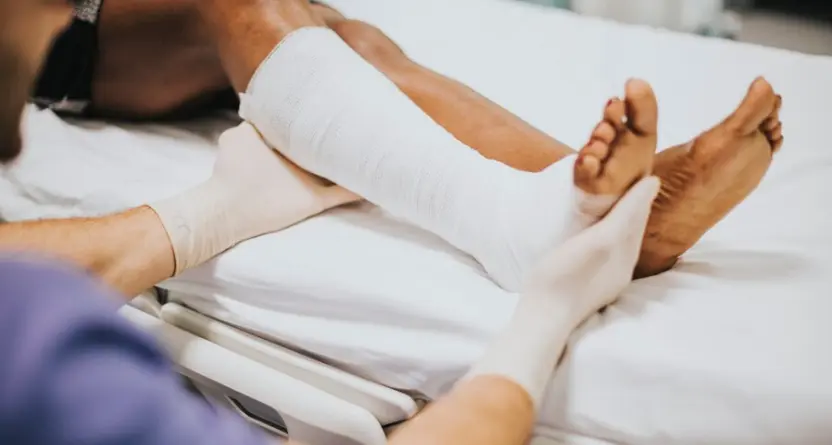Understanding The Risks Of Orthopedic Surgery
Category: Orthopedics
Orthopedic surgery is a vital medical intervention for those dealing with musculoskeletal issues, offering solutions for pain relief, mobility restoration, and improved quality of life. However, like any surgical procedure, orthopedic surgeries come with inherent risks, including infection, blood clots, nerve damage, and complications related to anesthesia. At Lokmanya Hospital we take proactive measures to ensure that risks are addressed before, during, and after surgery. We undertake comprehensive evaluations, including blood tests, imaging, and physical exams that help to identify potential complications before surgery.
Common Types Of Orthopedic Surgeries
Orthopedic surgeries range from minimally invasive procedures to complex operations. Some of the most common procedures include:
- Joint Replacement Surgery: Replacing damaged joints, such as hip or knee replacements.
- Arthroscopy: A minimally invasive procedure for diagnosing and treating joint issues.
- Spinal Surgery: Procedures like laminectomy, spinal fusion, or discectomy for back and neck problems.
- Fracture Repair: Fixing broken bones using screws, plates, or rods.
- Rotator Cuff Repair: Addressing shoulder injuries caused by tears in the rotator cuff.
While these surgeries aim to restore function and alleviate pain, understanding the risks associated with them is essential for patients and caregivers.
Causes Of Risks In Orthopedic Surgery
The causes of risks in orthopedic surgery often stem from various factors, including:
- Infection
- Poor wound care or hygiene.
- Prolonged surgery duration.
- Use of contaminated surgical tools.
- Blood Clots (Deep Vein Thrombosis)
- Reduced mobility during recovery.
- Pre-existing clotting disorders.
- Dehydration during the perioperative period.
- Nerve or Tissue Damage
- Proximity of the surgery site to major nerves.
- Improper surgical techniques.
- Complications from Anesthesia
- Allergic reactions to anesthesia.
- Underlying medical conditions like respiratory or cardiac issues.
- Implant Failures
- Use of substandard materials.
- Improper positioning of implants.
Symptoms Of Risks Post-Surgery
- Infection
- Redness, swelling, or warmth at the surgical site.
- Pus or fluid discharge from the wound.
- Persistent fever.
- Blood Clots
- Swelling in the leg or calf.
- Pain or tenderness in the affected area.
- Difficulty breathing (potential sign of pulmonary embolism).
- Nerve or Tissue Damage
- Numbness or tingling near the surgery site.
- Weakness in the affected limb.
- Persistent sharp or shooting pain.
- Complications from Anesthesia
- Nausea or vomiting.
- Dizziness or confusion.
- Respiratory distress.
- Implant Issues
- Pain or instability in the joint.
- Unusual clicking or grinding sounds during movement.
- Recurring inflammation.
Prevention Measures For Risks In Orthopedic Surgery
Pre-Surgery Measures
- Choose an Experienced Surgeon: Opt for a reputed healthcare facility with skilled surgeons and advanced technology.
- Preoperative Health Optimization:
- Control chronic conditions like diabetes, hypertension, or obesity.
- Quit smoking to improve blood flow and wound healing.
- Maintain a healthy diet to boost immunity.
- Complete Medical Disclosure: Inform your doctor about all pre-existing conditions, allergies, and medications, including supplements.
During Surgery
- Hygiene and Sterilization: Ensure the surgical facility adheres to strict sterilization protocols.
- Use of Advanced Techniques: Minimally invasive procedures reduce tissue damage and recovery time.
- Skilled Anesthesiology: A trained anesthesiology team ensures safe administration and monitoring.
Post-Surgery Measures
- Follow Postoperative Instructions: Adhere to the doctor’s advice on wound care, medication, and activity levels.
- Wound Care: Keep the surgical site clean and dry; watch for signs of infection (redness, swelling, pus).
- Hydration and Nutrition:
- Stay hydrated to aid recovery and prevent complications like blood clots.
- Consume a balanced diet rich in protein, vitamins, and minerals for tissue repair.
- Gradual Physical Activity:
- Start light physiotherapy as prescribed to regain mobility and reduce clot risks.
- Avoid overexertion to protect the healing area.
- Regular Follow-Ups: Attend all scheduled check-ups to monitor recovery and address complications early.
Why Choose Lokmanya Hospitals For Orthopedic Surgery?
Orthopedic surgery requires precision, expertise, and a focus on safety to minimize risks and maximize benefits. Lokmanya Hospital excels in all these areas, offering patients the confidence and care they need for a successful recovery.
By choosing Lokmanya Hospital, you are opting for trusted specialists, advanced technology, and a comprehensive care plan designed to minimize risks and deliver optimal outcomes. Trust Lokmanya to guide you through every step of your orthopedic surgery journey with professionalism, compassion, and excellence.
Conclusion
Orthopedic surgery is a powerful tool for improving musculoskeletal health, but it is not without risks. Understanding these risks, being proactive in prevention, and choosing an experienced medical team can significantly enhance the likelihood of a successful outcome.
If you are considering orthopedic surgery, ensure you have all the information you need to make an informed decision. With proper care and collaboration between you and your healthcare team, you can minimize risks and achieve the best possible results.
FAQ’s
- How long does it take to recover from orthopedic surgery?
Recovery varies by procedure. Joint replacements may take 6–12 weeks, while arthroscopy often heals in 2–6 weeks. - Are there non-surgical alternatives to orthopedic surgery?
Yes, options include physical therapy, medication, lifestyle changes, and injections like corticosteroids or PRP. - Will I need physical therapy after orthopedic surgery?
Most likely, as it helps restore strength, mobility, and function while preventing complications. - What kind of anesthesia will be used for my surgery?
General anesthesia for major surgeries; regional or local anesthesia for smaller procedures. - Are orthopedic implants permanent?
Most last 15–20 years but may require revision surgery over time due to wear and tear. - What lifestyle changes should I adopt post-surgery?
Maintain a healthy weight, avoid high-impact activities, and stay active with low-impact exercises.







